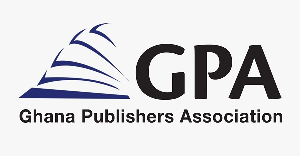- Home - News
- TWI News | TV
- Polls
- Year In Review
- News Archive
- Crime & Punishment
- Politics
- Regional
- Editorial
- Health
- Ghanaians Abroad
- Tabloid
- Africa
- Religion
- Election 2020
- Coronavirus
- News Videos | TV
- Photo Archives
- News Headlines
- Press Release
Press Releases of Tuesday, 23 April 2024
Source: Ghana Publishers Association
Ghana Publishers Association statement on World Book and Copyright Day 2024
Today, the 23rd day of April, 2024 is World Book and Copyright Day. Every year, since 1995, when the United Nations Scientific and Educational Organisation (UNESCO) established the Day to promote reading, publishing, and copyright, we have been paying tribute to books and creativity.
This year is the 29th year of the celebration of the World Book and Copyright Day. There have been several speeches over the years dedicated to books and copyright. In fact, there have been some philosophical pronouncements about books, and this year, by the time the celebrations end, more speeches would be added to the collection.
Books, reading and literacy have been great contributors to most important transformational scenes in some individual lives, communities, governance and many nations.
The difference between Ghana and other countries that have seen individual lives being:
• transformed
• communities showing great societal developments such as poverty reduction
• adherence to the rule of law
• improved sanitation
• other social improvement indicators
have been how they have improved their collection of books, incorporated reading and literacy into the cultural concepts of the country especially in the year of Accra World Book Capital.
We cannot pretend to be functionally literate. We cannot pretend that there are no inequalities in our lives. Inequalities have never been a permanent life condition. It a creation of our choices. Making choices are reasonable occurrence in life.
We are all confronted by countless choices each day. Some have minimal consequences; other decisions can be life changing. And while some of these choices may impact our lives today, other choices may not affect us for years to come. The important thing to remember is that we are a product of the choices we make. Each decision helps to define who we are and how different we are from one another. Making good choices begins with taking charge of the decision-making process.
Books have always been with us. Reading is an activity that has been with us, and functional literacy programmes have been designed for our children and adults at a point. All these are not offering us the opportunity to appreciate our lifestyle choices. The reason for this is simple. We have not been able to organise a successful integration policy for books, reading and the natural outcome, functional literacy.
Progressive policies such as a National Book Development and Reading Policy and ensuring consistent procurement of supplementary readers for school, community and public libraries are lacking in the book industry space.
The industry expects the Ghana Book Development Council (GBDC) to respectively conclude discussions and finalising the documents this year. This is to increase the interest and contributions of the book industry stakeholders to book development and reading promotion efforts to be led by the GBDC.
The structure of the school curriculum does not encourage the use of books outside the school. Children and students are not encouraged to read books, supplementary reading books. The children are not supplied with basic reading materials by the schools and parents are expecting the state to provide books for their children.
Between 1999 and now, there have been only one major procurement of reading materials, and that was for basic schools. Even that, it was a programme of the British Government under their international funding agency, the Department for International Development (DFID). This means that potentially, school children who passed through the system between 2000 and now have not had the opportunity to be part of any regulated reading programme. The inadequate library resources have added to the quagmire.
As a country, we have not seen any profound policy initiative that seeks to anchor our cultural, social, and economic growth on books and other literary activities. Such policy initiative should facilitate the process of creating opportunities for literacy to be a measure of either reducing or eradicating the grave inequalities that are threatening the stability of the country.
All these are consequential to our inability to make choices amid all the options. This failure is responsible for the outcome we are witnessing today.
Everyday, individuals, communities, Municipalities, Metropolitan areas, and other government organisations have choices to make. They have responsibility to reduce inequalities and promote self-empowerment.
The country’s development cannot be achieved without reducing the inequalities that exist among the citizens and communities.
Countries that have advanced in progress and development have all anchored their enhancements on the development of a literate population. Books and reading have played a key role in the promotion of literacy as a concept for economic, social, and scientific progress.
Early reading and quality education are the most important tools that could alleviate the circumstance that contribute to inequality.
Investments in education, beginning with early childhood reading programmes could translate into viable economic mobility, contribute to increased productivity, and decrease inequality. There must be a conscious effort to improve the quality of life of the citizens by providing direct support for the development of the creative and analytical skills through early childhood reading programmes targeted especially at building the literacy skills of these children. The government and civil society organisations should help in this regard.
Literature is essentially the exploration of the human experience, says Keith Oatley, a novelist and professor emeritus of Cognitive Psychology at the University of Toronto.
Reading novels enables us to become better at actually understanding other people and what they are up to,” says Oatley. “She continued, low-income children have fewer books in their homes and classrooms, and more restricted access to public libraries.
Inequalities are everywhere. In our homes, Communities, Districts, Municipalities, Metropolitan Areas, and the Country. It takes a conscious, and pragmatic policy initiative to reduce inequalities in our lives. We must as a country, teach our young ones to be resilient.
One of the assured ways to reduce social and economic inequalities is to inculcate the habit of reading, encourage the application of creativity in our young ones. Offering them better choices for social and economic empowerment.
One of the everlasting and monumental gifts ever to have been presented to the world is the “Book”. Government action in promoting literacy should be strengthened. Institutions and organisations must consider procuring reading books and support reading programmes.
Reading has been proven to be a transformational activity. People have a better understanding of life and culture when they are introduced to reading and encouraged to read. Books and reading, enhances the mental capacities of the reader and strengthens his or her creative and analytical skills.
One of the opportunities of reading a book is the gathering of knowledge and experience.
Another important advantage of books and reading is the expansion of your viewpoint about life.
Reading and literacy are enablers to the development of the human resources of a country. The quality of the human resource will set the stage for any development initiatives that could create sustainable opportunities for the people in the country.
Reading has been proven to be the most important wheels to promote literacy and development.
The late United Nations Secretary-General, Busumuru Kofi Annan said “Literacy is a key lever of change and a practical tool of empowerment on each of the three main pillars of sustainable development: economic development, social development and environmental protection.
Developing literacy can help build the knowledge and outlook of the citizens, promoting understanding of key concepts and issues of governance, and workable social intervention measures. Reading and Literacy can make it possible for the citizens to have an inclusivity agenda to nation building and self-empowerment.
Functional Literacy has been linked to various social improvement outcomes: improvement in health, life expectancy, gender, poverty alleviation, sanitation and many more.
We need to encourage our citizens to participate effectively in national development, the key factor important for integration is reading and literacy.
As mentioned earlier, the knowledge and outlook of the citizens are highly affected by the status of their literacy. We need a functionally literate society that has an inbuilt creative ability and is ready to integrate into the global system.
As a country, we must invest in our people. Starting with early childhood reading and literacy development. We must demonstrate our commitment to building a nation that has its developmental successes grounded in the quality of the people who are at the forefront of this nation building agenda.
The state must assure the people of its unflinching conviction in reducing inequalities by supporting each and every one through good policies and carefully considered choices. There should be a national consciousness that permeates every aspect of our lives aiming at achieving full literacy overtime.
We must not delude ourselves that somehow things would work out by themselves. Nothing happens by chance.
Books are important! Reading is the foundation of learning! Functional literacy is the guaranteed commodity that would spur our social, cultural, and economic development, promoting creativity, an important property in the 21st century.
Let us invest in books.











